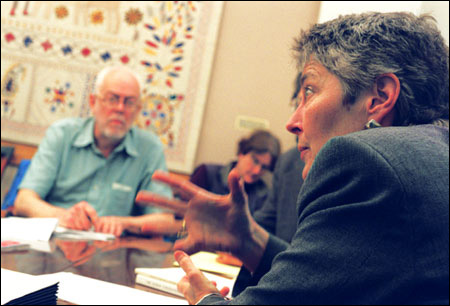Iraqi reconstruction a tall order for U.S.:
SPH professor says standards high for U.S. conduct in war

As the aggressor in a war it chose to wage, the United States is being judged by high standards in its conduct of both the war and its aftermath, School of Public Health Professor Jennifer Leaning said Tuesday (April 22).
Leaning, who labeled the war “illegitimate,” was sharply critical of the United States’ handling of the conflict. She said the destruction of hospitals and museums, the lack of accounting for Iraqi war dead, the delay in declaring the hostilities over, and the continued resistance to international involvement were all troublesome.
She said some U.S. “failures,” such as the failure to provide security in conquered cities and the failure to protect hospitals from looting, violate international conventions, though not to the extent that they constitute war crimes. Damage from looting alone, she said, amounts to hundreds of millions of dollars and will need to be repaired as part of the reconstruction.
“We’re coming from behind not because we waged a long and bloody war,” Leaning said. “We’re coming from behind because we waged an illegitimate, short, and untidy war.”
Leaning’s comments came during a talk at the Center for Population and Development Studies. Leaning, who said she hasn’t yet visited Iraq, spoke from her long experience in conflict-torn areas, including Afghanistan, Kosovo, Somalia, Albania, and the former Soviet Union.
Leaning, a professor of international health at the School of Public Health and assistant professor at Harvard Medical School, is the director of the Program on Humanitarian Crises and Human Rights at the François-Xavier Bagnoud Center for Health and Human Rights. She is also the director of the Human Security Program at the Harvard Center for Population and Development Studies.
The seminar, attended by several dozen people, provided a forum for airing various opinions on the war.
After her comments, Leaning fielded questions from the audience, including several who said she was judging the United States too harshly and that she should reserve some criticism for Iraqi dictator Saddam Hussein, responsible for far more Iraqi deaths than the current conflict.
Leaning agreed that Hussein’s human rights record was atrocious, so much so that there is a real split in the American human rights community over the need for the war. Still, she said, the United States’ disregard of the international community in conducting the war both makes the war illegitimate and requires the U.S.’ actions to be judged by the highest standards.
“A number believe that Saddam Hussein is the worst human rights abuser now alive,” Leaning said. “His record is deep, in most cases unknown, and in most cases utterly despicable…. [Even so] it’s difficult to find an international lawyer who thinks the action the U.S. took was legitimate.”
The first and most pressing priority for the United States, Leaning said, is to provide security. Only with a secure environment can international humanitarian organizations move into Iraq and begin providing aid for the Iraqi people. She asserted that the failure to provide immediate security to control civil unrest is a failing of the military campaign, as is the failure to identify Iraqi war dead, both military and civilian.
She also added her voice to the chorus of criticism over the purported failure of the United States to protect Iraqi cultural institutions, which housed numerous items from Iraq’s long history of civilization.
“[Protecting museums and libraries] could have happened, it didn’t happen, and civilization is the worst for it. That is not an exaggeration,” Leaning said.
The United States, claimed Leaning, is dragging its feet declaring the war over in order to give itself continued freedom to use military actions in the nation. Once the country is declared occupied, she said, international law puts a host of obligations on the occupying country to provide services to the population. Though Leaning said the military appears to have shifted from a war mode to an occupying mode, the declaration of victory has been delayed.
“This provides cover for what the U.S. does,” Leaning said. “The U.S. is going to delay as long as possible [a declaration] that it is in occupation mode…. This provides running room for the Pentagon and for [Defense Secretary Donald] Rumsfeld in particular.”
Michael Reich, director of the Center for Population and Development Studies and Taro Takemi Professor of International Health Policy at the School of Public Health, said Leaning’s talk will help foster discussion about what actions we can take to improve the situation in Iraq. The time is short for such discussion, he said, because things that are happening there now will have lasting impacts.
“The ramifications of what we’ve seen happen in an amazingly short time – a month – we’ll be living with for a long time,” Reich said.




